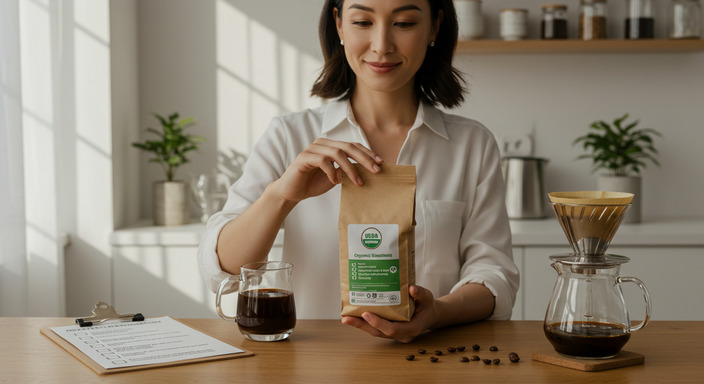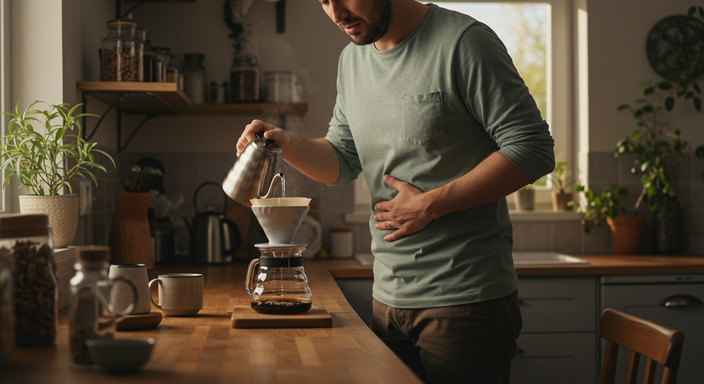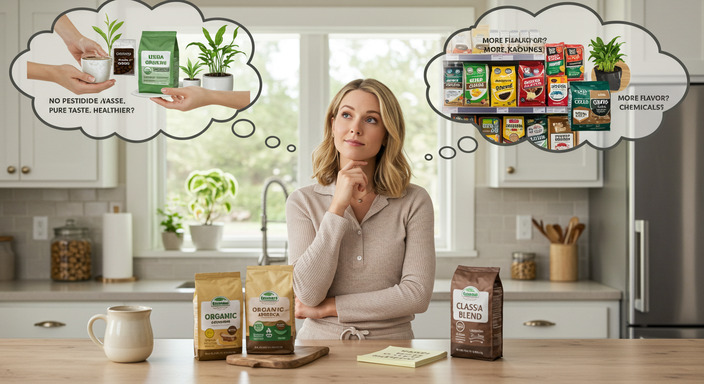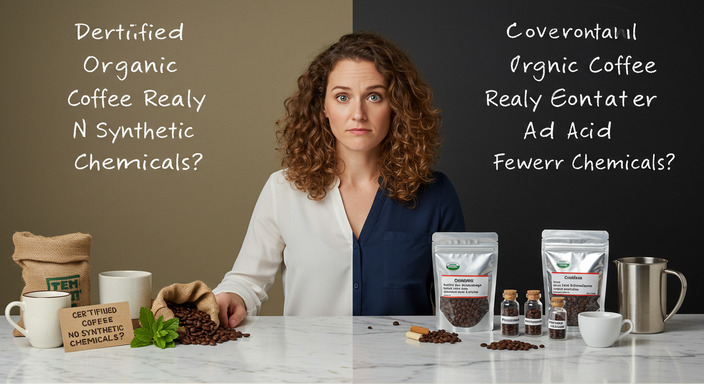
What Does USDA Organic Mean? A Simple Guide to Organic Coffee

Table of Contents
ToggleUnderstanding USDA Organic Certification
What the USDA Organic Label Represents
The USDA Organic label is a trusted symbol that signifies a product has been grown, processed, and handled according to strict federal guidelines. For coffee, this means the beans are cultivated without the use of synthetic pesticides, herbicides, or genetically modified organisms (GMOs). Instead, organic farming relies on natural methods to maintain soil health and control pests, ensuring a more sustainable and eco-friendly approach to agriculture.
The Strict Standards Required for Certification
To earn the USDA Organic certification, coffee producers must adhere to rigorous standards that cover every step of the process, from seed to cup. These include:
- Using organic seeds and avoiding synthetic chemicals.
- Implementing crop rotation and other natural practices to enhance soil fertility.
- Ensuring that processing facilities are free from contamination by non-organic substances.
- Undergoing regular inspections by certified agents to verify compliance.
These measures ensure that the final product is truly organic and meets the high expectations of consumers.
Why USDA Organic is Trusted by Consumers
Consumers trust the USDA Organic label because it represents transparency, quality, and a commitment to environmental stewardship. Choosing organic coffee not only supports healthier ecosystems but also promotes the well-being of farmers and their communities. By opting for USDA Organic products, individuals can feel confident they are making a sustainable, ethical, and health-conscious choice that aligns with their values.
What Makes Coffee Organic?
Organic Farming Practices for Coffee Beans
Organic coffee is grown using methods that prioritize environmental health and sustainability. Instead of relying on synthetic fertilizers and pesticides, organic farmers use natural alternatives like compost, manure, and cover crops to nourish the soil. These practices help maintain soil fertility and reduce pollution. Additionally, organic coffee farms often employ techniques such as shade-growing, where coffee plants are cultivated under the canopy of trees. This not only supports the coffee plants but also protects local ecosystems and wildlife.
Prohibited Substances in Organic Coffee Production
To be certified organic, coffee must be grown without the use of certain harmful substances. The USDA Organic standards strictly prohibit:
- Synthetic pesticides and herbicides – These chemicals can harm the environment and human health.
- Chemical fertilizers – Synthetic fertilizers can degrade soil quality and contaminate water sources.
- Genetically modified organisms (GMOs) – Organic coffee must be grown from non-GMO seeds.
By avoiding these substances, organic coffee production ensures a cleaner, safer product for consumers and a healthier planet.
The Role of Biodiversity in Organic Coffee Farms
Biodiversity is a cornerstone of organic coffee farming. Shade-grown coffee, for example, creates habitats for birds, insects, and other wildlife, fostering a balanced ecosystem. This diversity helps naturally control pests and diseases, reducing the need for chemical interventions. Moreover, organic farms often include a variety of plant species alongside coffee, which enriches the soil and supports pollinators like bees. By embracing biodiversity, organic coffee farming not only produces better coffee but also contributes to the preservation of our planet’s natural resources.
Health Benefits of Organic Coffee
Fewer Pesticides and Chemicals in Your Cup
When you choose organic coffee, you’re opting for a brew that’s free from synthetic pesticides, herbicides, and chemical fertilizers. Traditional coffee farming often relies on these substances, which can leave residues on the beans. Organic coffee, on the other hand, is grown using natural methods that prioritize soil health and environmental sustainability. This means you’re enjoying a cleaner cup, with fewer harmful chemicals entering your body.
Rich in Antioxidants and Natural Nutrients
Organic coffee is a powerhouse of antioxidants, which help combat oxidative stress and support overall health. Because organic farming practices focus on maintaining nutrient-rich soil, the coffee beans absorb more natural minerals and compounds. This results in a brew that’s not only flavorful but also packed with beneficial nutrients like chlorogenic acid, which has been linked to reduced inflammation and improved heart health.
How Organic Coffee Supports Overall Well-Being
Switching to organic coffee can be a simple yet impactful way to support your well-being. By avoiding synthetic chemicals, you’re reducing your exposure to potential toxins that could disrupt your body’s natural balance. Additionally, the antioxidants in organic coffee can boost your immune system, improve mental clarity, and even enhance energy levels. For many, it’s not just about the taste—it’s about making a healthier choice for themselves and the planet.
Environmental Impact of Organic Coffee
Soil Health and Sustainable Farming Practices
Organic coffee farming prioritizes the health of the soil, which is the foundation of any thriving ecosystem. Instead of relying on synthetic fertilizers and pesticides, organic farmers use natural methods like composting, crop rotation, and cover crops. These practices enrich the soil with essential nutrients, improve its structure, and promote microbial activity. Healthy soil not only produces better coffee but also reduces erosion and helps retain water, making farms more resilient to droughts and climate change.
Reduced Water and Air Pollution
Conventional coffee farming often involves chemicals that can seep into waterways or evaporate into the air, harming both the environment and nearby communities. Organic coffee, on the other hand, avoids these harmful substances. By using natural pest control and organic fertilizers, organic farming minimizes water contamination and reduces the release of toxic chemicals into the air. This means cleaner drinking water for local populations and a healthier atmosphere for everyone.
Supporting Ecosystems and Wildlife
Organic coffee farms are often designed to work in harmony with nature. Many organic coffee growers cultivate their crops under the shade of trees, creating a habitat for birds, insects, and other wildlife. This approach preserves biodiversity and helps protect endangered species. Additionally, organic farming avoids the use of harmful pesticides that can disrupt ecosystems and harm pollinators like bees. By choosing organic coffee, you’re supporting farming practices that safeguard the planet’s delicate balance and promote a healthier environment for all living creatures.
Ethical Benefits of Choosing Organic
Fair Wages and Better Working Conditions for Farmers
When you choose organic coffee, you’re supporting a system that prioritizes fair wages and better working conditions for farmers. Organic farming often adheres to stricter labor standards, ensuring that those who grow and harvest your coffee are treated with dignity and respect. This means safer working environments, reasonable hours, and wages that reflect the hard work behind every bean.
Supporting Small-Scale and Family-Owned Farms
Organic coffee is frequently produced by small-scale and family-owned farms, which are the backbone of sustainable agriculture. By choosing organic, you’re helping these farmers maintain their livelihoods and preserve traditional farming practices. This support fosters economic stability in rural communities and encourages the continuation of environmentally friendly methods passed down through generations.
Promoting Transparency in the Supply Chain
Organic certification requires a high level of transparency in the supply chain. This means you can trust that the coffee you’re drinking was produced in a way that aligns with your values. From the farm to your cup, every step is documented and verified, ensuring that ethical practices are upheld. This transparency empowers you to make informed choices and feel confident about the impact of your purchase.
How to Identify Truly Organic Coffee
Reading Labels and Understanding Certifications
When shopping for organic coffee, the first step is to read the label carefully. Look for the USDA Organic seal, which guarantees that the coffee meets the strict standards set by the United States Department of Agriculture. This means the coffee was grown without synthetic pesticides, genetically modified organisms (GMOs), or chemical fertilizers. Additionally, other certifications like Fair Trade or Rainforest Alliance can indicate ethical and sustainable farming practices, though they don’t necessarily mean the product is organic.
- USDA Organic: Ensures 95% or more of the ingredients are organic.
- Fair Trade: Promotes fair wages and sustainable farming methods.
- Rainforest Alliance: Focuses on environmental and social responsibility.
Be wary of terms like “natural” or “eco-friendly,” as they are not regulated and can be misleading.
Trusted Brands and Retailers for Organic Coffee
Choosing a reputable brand can simplify your search for truly organic coffee. Some well-known brands that consistently offer USDA Organic-certified coffee include:
- Equal Exchange: Known for its commitment to fair trade and organic farming.
- Bulletproof: Offers high-quality organic coffee with a focus on health benefits.
- Stumptown Coffee Roasters: A leader in sustainable and organic coffee sourcing.
Retailers like Whole Foods, Thrive Market, and even larger chains such as Costco often stock a variety of organic coffee options. Shopping from these trusted sources can help ensure you’re getting a genuine product.
Avoiding Misleading Marketing Claims
Marketing can sometimes blur the lines between what’s truly organic and what’s just “sustainable” or “natural.” Here’s how to navigate the claims:
- Look beyond buzzwords: Phrases like “green,” “eco-friendly,” or “sustainably sourced” don’t guarantee organic status.
- Check the back label: The front of the packaging might highlight positive attributes, but the certification details are usually listed on the back.
- Research the brand: A quick online search can reveal whether a brand has a history of transparency and adherence to organic standards.
Remember, truly organic coffee is not just about what’s in your cup—it’s about supporting healthier ecosystems, fair labor practices, and a more sustainable future.
Making the Switch to Organic Coffee
Transitioning to organic coffee is more than just a change in your morning routine—it’s a step toward a healthier lifestyle, a cleaner environment, and a more ethical way of consuming. Whether you’re a coffee enthusiast or a casual drinker, understanding how to make the switch can help you balance cost, quality, and sustainability while making a positive impact.
Tips for Transitioning to Organic Coffee
Switching to organic coffee doesn’t have to be overwhelming. Here are some simple tips to get started:
- Start small: Begin by replacing one cup of your regular coffee with an organic option. Gradually increase as you get used to the taste and quality.
- Read labels: Look for the USDA Organic seal to ensure the coffee meets strict organic standards.
- Explore brands: Try different organic coffee brands to find one that suits your taste preferences.
- Buy in bulk: Purchasing larger quantities can often reduce costs and minimize packaging waste.
Balancing Cost with Quality and Sustainability
Organic coffee can sometimes come with a higher price tag, but the benefits often outweigh the cost. Here’s how to balance your budget while prioritizing quality and sustainability:
- Invest in value: Consider the long-term health and environmental benefits of organic coffee as part of its value.
- Support local: Look for local roasters or cooperatives that offer organic options at competitive prices.
- Brew at home: Making coffee at home is often more cost-effective than buying from cafes, and it allows you to control the quality of your brew.
How Your Choice Impacts Health, the Environment, and Communities
Choosing organic coffee isn’t just about taste—it’s about making a difference. Here’s how your decision can create a ripple effect:
- Health benefits: Organic coffee is free from synthetic pesticides and chemicals, reducing your exposure to harmful substances.
- Environmental protection: Organic farming practices promote soil health, conserve water, and reduce pollution, helping to protect ecosystems.
- Community support: Many organic coffee producers are small-scale farmers who rely on fair trade practices, ensuring they receive fair wages and better working conditions.
FAQ
Is organic coffee more expensive? Yes, organic coffee can be pricier due to the labor-intensive farming practices and certifications required. However, the long-term benefits to health and the environment often justify the cost. Does organic coffee taste better? Many people find that organic coffee has a cleaner, more robust flavor because it’s grown without synthetic chemicals. Taste is subjective, so it’s worth trying different brands to find your favorite. Can I find organic coffee at regular grocery stores? Yes, many grocery stores now carry organic coffee options. Look for the USDA Organic seal to ensure authenticity.
Making the switch to organic coffee is a simple yet powerful way to align your daily habits with your values. By choosing organic, you’re not only enhancing your own well-being but also contributing to a healthier planet and more equitable communities. Every sip counts!
is a writer and editor at Coffee With Finance, blending her love for coffee, personal finance, and visual storytelling. She crafts engaging articles, curates site images, and shares brewing tips, bean origins, and practical money advice. Anna believes that managing finances, like making great coffee, should be intentional and rewarding — bringing clarity, warmth, and beauty to every story she tells.




























Post Comment